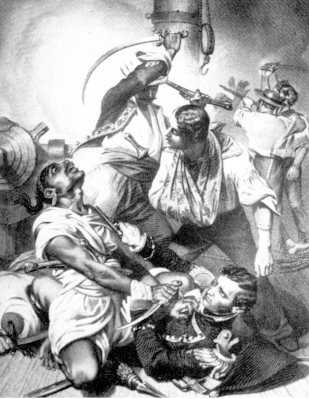Historical Interlude
 If
you ever visit the US Capitol, you'll find there this very fine painting by
Alonzo Chapell of an incident that took place during the Barbary Wars, the series
of conflicts fought by the United States in the late 18th and early 19th Centuries
against the marauding pirates of the North African Coast. When the Marines sing
about "...to the shores of Tripoli..." this is the war they
mean.
If
you ever visit the US Capitol, you'll find there this very fine painting by
Alonzo Chapell of an incident that took place during the Barbary Wars, the series
of conflicts fought by the United States in the late 18th and early 19th Centuries
against the marauding pirates of the North African Coast. When the Marines sing
about "...to the shores of Tripoli..." this is the war they
mean.
A boarding party had climbed onto the deck of the USS
Philadelphia, an American warship that had been captured by the pirates
after running aground in Tripoli harbor. To prevent it from being used by the
enemy, their mission was to burn the vessel. They succeeded brilliantly
in this, one of the earliest heroic feats of the American Navy.
In the confusion
and smoke of the hand to hand fighting, the leader of the boarding party was beaten to his knees, and as he
was getting up a pirate rushed over, and raised his scimitar to lop off his
head. This would surely have ruined the Captain's day had the pirate succeeded;
but a seaman named Rueben James interposed himself under the scimitar and took
the blow, sacrificing his life for his Captain. The painting depicts the instant.
The United States Navy has certain conventions on naming of ships: destroyers
are named after naval heroes. A destroyer named USS Rueben James
was one of the first American ships sunk in the Second World War, torpedoed without
warning by a German U-boat off Cape Hatteras. A new Reuben James is in
commission, and carries on the legacy and name of a man whose individual act
of bravery changed the course of history.
Close This Window
 If
you ever visit the US Capitol, you'll find there this very fine painting by
Alonzo Chapell of an incident that took place during the Barbary Wars, the series
of conflicts fought by the United States in the late 18th and early 19th Centuries
against the marauding pirates of the North African Coast. When the Marines sing
about "...to the shores of Tripoli..." this is the war they
mean.
If
you ever visit the US Capitol, you'll find there this very fine painting by
Alonzo Chapell of an incident that took place during the Barbary Wars, the series
of conflicts fought by the United States in the late 18th and early 19th Centuries
against the marauding pirates of the North African Coast. When the Marines sing
about "...to the shores of Tripoli..." this is the war they
mean.